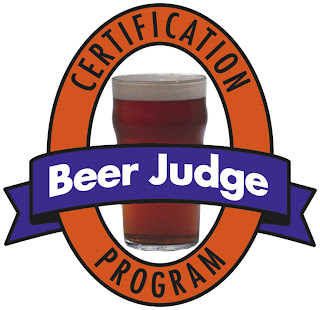I passed the BJCP Tasting Exam last August and have been slowly immersing myself in the process of evaluating beer objectively. When people unfamiliar with craft beer talk to you about being a beer judge, the reactions are pretty typical of what you might expect. People think you get paid to drink beer or that judging is an excuse to over indulge. The truth is that being a beer judge is actually pretty challenging. For the uninitiated, I thought I'd share some information about the BJCP, and maybe provide some insight for those of you thinking about judging beers, too.
The Process
The BJCP has gone through some changes recently and the process of becoming a part of the BJCP has been steamlined significantly. Becoming a judge is a three part process, but continuing education and experience is an essential component.Entrance Exam
This online assessment consists of 200 questions that have to be answered in one hour (over 3 questions/minute!) and covers the BJCP Style Guidelines and other beer and brewing topics that are essential knowledge for a judge. I studied for the test for a solid week, spending time each night after work reading through the style guidelines and thinking about/tasting beers in different styles. I was able to pass the first time, but it was a lot of questions in a short period of time. Having the style guidelines around as a reference was helpful, but going into the test without any preparation would have been disastrous.Tasting Exam
After passing the Entrance Exam you're eligible to sit for the Tasting Exam. The exam involves tasting 6 different beers and evaluating them as you would in a beer competition. You have 15 minutes to judge each beer, a process that involves the application of sensory skills to the beer and ends with those interpretations being communicated on the judging sheet. You're told the beer style, just as you would be in a real competition, but everything else is on your own. Beers can be doctored to make them taste different or can be miscategorized. You're not allowed any notes or aids during tasting. Passing scores on the Tasting Exam play a part (along with Experience Points) in determining your BJCP rank.Experience Points
When you participate in a beer competition as a judge, proctor or organizer you earn experience points which help you advance through the ranks of the BJCP. This makes sense, as the most capable judges are the most seasoned and practiced. Here's how the rankings shake out:
Rank
|
Tasting Exam Score
|
Experience Points
|
Apprentice
|
Less than 60%
|
N/A
|
Recognized
|
60-69%
|
N/A
|
Certified
|
70-79%
|
5
|
National
|
80-89%
|
20
|
Master
|
90% or above
|
40
|
There are additional rankings associated with Grand Master and the levels of Grand Master that one obtains with additional experience and service to the BJCP.
 |
| Judging table at AFC |
One of the best things about beer judging is the chance to meet people who have a similar passion for beer and brewing. I learned a lot from the judges that I worked with both times and I look forward to judging more. It's interesting to think about the role of labels and categorization in something like beer that has so many variations and is so dependent on individual taste. On the one hand, it's impossible to compare beers and learn more about them without guidelines to follow. On the other hand, many of the most interesting and exciting beers are those that ignore (or explode) the superficial parameters we use to categorize them. Philosophical concerns aside, it's all part of the process of enhancing one's knowledge and finding new ways to enjoy something that has innumerable variations. Judging beer properly is challenging. I suppose that's why the BJCP website features the slogan: "It's Tough But Fair."
There's a wealth of additional information to be found on the BJCP's website. It's valuable for those interested in being part of the BJCP or for those just interested in learning how to evaluate beer:

No comments:
Post a Comment
Have something to say?